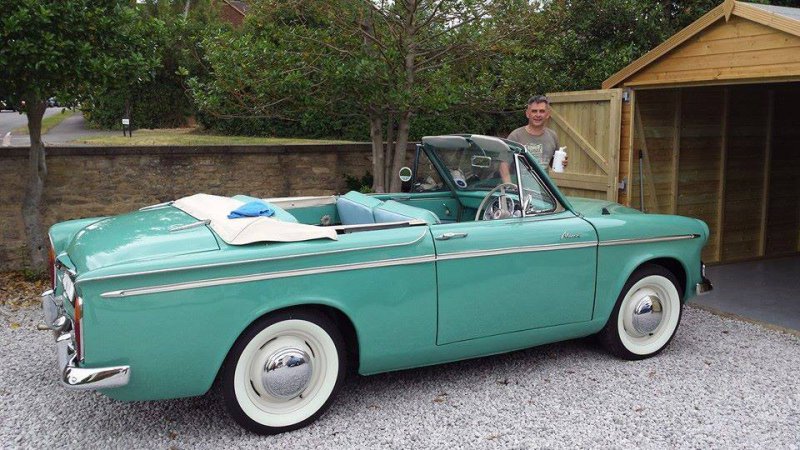You are using an out of date browser. It may not display this or other websites correctly.
You should upgrade or use an alternative browser.
You should upgrade or use an alternative browser.
Summer fun
- Thread starter mattjevans
- Start date
mattjevans
Junior Member
- Messages
- 386
That would also describe the car...
Zep
Moderator
- Messages
- 9,297
Technically AC shouldn't be regarded unless it is checked to be leak free (vacuum test) so we don't release AC gas uneccessarily. Problem is not everyone is strict on this.
Ideally every 3 years, working or not, the system should be emptied, vacuum dried, leak tested, then refilled. A service cost for sure but avoided longer term (higher) costs.
I would switch AC off, then adjust all settings to maximum, run the engine till warm, then switch on AC. You will either hear the clutch kick in or not (you may also hear the revs drop or falter).
Low gas (already leaked away) or absorbed (defective drier) shouldn't be discounted.
Sent from my ONEPLUS A5010 using Tapatalk
I respectfully disagree.
Automatic automotive recharge stations pull a vacuum before charging and if they cannot pull the vac they will not put any gas into the system. The only real way to test a system is leak free is to use oxygen free nitrogen and pressure test to operating pressure. The pressure difference on a vacuum test is a maximum of 1 bar, but the operating pressure will be up to 12 bar so clearly a vac test is not good enough, but this doesn't stop a lot of garages doing it the wrong way in the automotive part of the trade.
There is absolutely no reason to remove refrigerant from a system and carry out a leak check on a periodic basis. Only if there is an operational reason like poor performance. If a system is working, leave it alone, breaking into it only increases the likelihood of introducing moisture or contamination and even creating a leak due to a stuck ball in a fitting. Any garage that says otherwise is trying to fleece you.
The drier does not absorb refrigerant, it is there to absorb moisture and to filter the refrigerant and oil to prevent minor contamination from circulating in the system. Over successive cycles of leak and recharge they eventually become waterlogged, cannot remove moisture and cause a blockage. Vacuuming will not allow a drier to recover, the vacuum process causes any free water to evaporate but that which is bound up in the desiccant will stay there.
conaero
Forum Owner
- Messages
- 34,639
What about the wife...how’s that training going?Hahaha ain't that the truth! Can't leave anything lying around otherwise things get "Beagled". She nips the **** out of me and I look like I self harm. It's not been easy but she's getting there with her training etc... sit when told to (mostly) and will fetch me items (remote control, ice cold beer from the fridge, answer the door etc..) but she won't stop digging the lawn yet.....
RobinL
Member
- Messages
- 456
No need to disagree. You are absolutely spot on. My observation would be that AC systems seem less robust these days as they are designed to minimise cost and the 'target' seems to be to outlast the OEM warranty by around 24 hours. It's a cost /risk balance I suppose.I respectfully disagree.
Automatic automotive recharge stations pull a vacuum before charging and if they cannot pull the vac they will not put any gas into the system. The only real way to test a system is leak free is to use oxygen free nitrogen and pressure test to operating pressure. The pressure difference on a vacuum test is a maximum of 1 bar, but the operating pressure will be up to 12 bar so clearly a vac test is not good enough, but this doesn't stop a lot of garages doing it the wrong way in the automotive part of the trade.
There is absolutely no reason to remove refrigerant from a system and carry out a leak check on a periodic basis. Only if there is an operational reason like poor performance. If a system is working, leave it alone, breaking into it only increases the likelihood of introducing moisture or contamination and even creating a leak due to a stuck ball in a fitting. Any garage that says otherwise is trying to fleece you.
The drier does not absorb refrigerant, it is there to absorb moisture and to filter the refrigerant and oil to prevent minor contamination from circulating in the system. Over successive cycles of leak and recharge they eventually become waterlogged, cannot remove moisture and cause a blockage. Vacuuming will not allow a drier to recover, the vacuum process causes any free water to evaporate but that which is bound up in the desiccant will stay there.
If you buy a car to keep for a year then if it works leave well alone. If you buy a car out of warranty that you expect to keep then maybe a new drier and clean out could be worth it at the first sign of trouble such as frequent regassing?
Sent from my ONEPLUS A5010 using Tapatalk
zagatoes30
Member
- Messages
- 20,971
Zep
Moderator
- Messages
- 9,297
No need to disagree. You are absolutely spot on. My observation would be that AC systems seem less robust these days as they are designed to minimise cost and the 'target' seems to be to outlast the OEM warranty by around 24 hours. It's a cost /risk balance I suppose.
If you buy a car to keep for a year then if it works leave well alone. If you buy a car out of warranty that you expect to keep then maybe a new drier and clean out could be worth it at the first sign of trouble such as frequent regassing?
Sent from my ONEPLUS A5010 using Tapatalk
You are right, a very well meaning effort to put less gas into these systems these days means they are more susceptible to poor operation due to small losses. On the plus side the ubiquity of a/c in cars now means the systems are better designed and maintainable.
For me it is lamentable that so much refrigerant is lost from cars due to the shonky way the garage trade deal with leak testing. At least it’s only 1420 times worse than CO2 for global warming!




